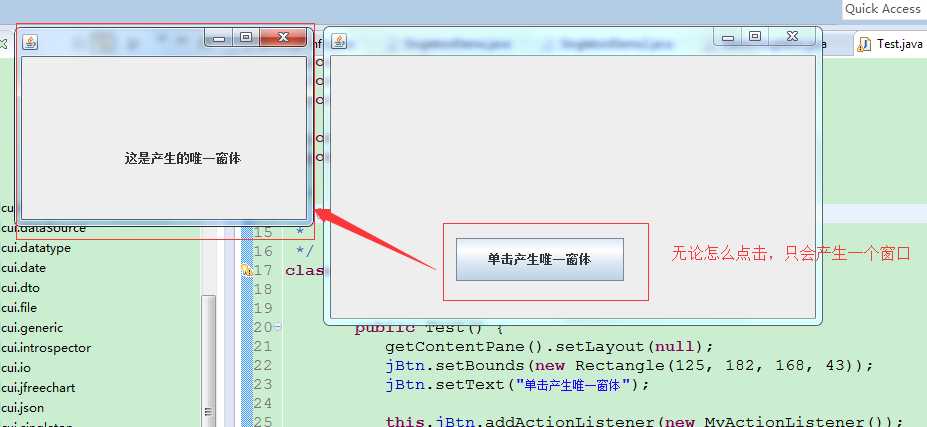标签:
一:单例设计模式的定义
单例设计模式,顾名思义,就是在整个程序运行过程中,只向外界提供一个对象,这样做可以避免资源的浪费,例如
我们打开回收站或者ppt时,只会启动一个窗口。
单例模式的java实现:
1:饿汉式
1 /** 2 * 3 */ 4 package com.hlcui.singleton; 5 6 /** 7 * @author Administrator 饿汉式单例类 8 */ 9 public class SingletonDemo { 10 // 1:内部创建一个对象 11 private static SingletonDemo single = new SingletonDemo(); 12 13 // 2:私有化构造方法 14 private SingletonDemo() { 15 16 } 17 18 // 3:对外界提供一个方法,获取SingletonDemo对象 19 public static SingletonDemo getInstance() { 20 return single; 21 } 22 }
2:懒汉式
1 /** 2 * 3 */ 4 package com.hlcui.singleton; 5 6 /** 7 * @author Administrator 懒汉式单例类 8 * 9 */ 10 public class SingletonDemo2 { 11 // 1:内部创建对象的引用 12 private static SingletonDemo2 single; 13 14 // 2:私有化构造方法 15 private SingletonDemo2() { 16 17 } 18 19 // 3:对外提供一个方法,获取对象,只是要进行判断 20 public static SingletonDemo2 getInstance() { 21 if (single == null) { 22 single = new SingletonDemo2(); 23 } 24 return single; 25 } 26 }
3:懒汉式与饿汉式比较
两种不同实现方式的区别:
<1> 从资源利用的角度看,懒汉式是在调用其静态方法的时候才被实例化的,所以要比饿汉式稍好一些。
<2> 从反映时间和速度上看,饿汉式在类加载的时候就得到了初始化,所以要比懒汉式好一些。
由上可见,创建一个单子类必须满足以下三个条件:
1.构造器私有
2.自己持有自身的一个静态引用
3.对外面系统提供访问唯一实例的公共静态接口(方法).
二:案例分析
1:单例代码
1 /** 2 * 3 */ 4 package com.hlcui.singleton; 5 6 import java.awt.Rectangle; 7 import java.awt.event.ActionEvent; 8 import java.awt.event.ActionListener; 9 10 import javax.swing.JButton; 11 import javax.swing.JFrame; 12 import javax.swing.JLabel; 13 14 /** 15 * @author Administrator 16 * 17 */ 18 public class DemoSingleton extends JFrame { 19 /** 20 * 21 */ 22 private static final long serialVersionUID = 1L; 23 // 一个私有的,静态的本类对象 24 private static DemoSingleton testFrame = new DemoSingleton(); 25 JLabel jLMes = new JLabel(); 26 27 // 构造必须是私有的,这样其它的类才不能访问 28 private DemoSingleton() { 29 getContentPane().setLayout(null); 30 this.getContentPane().add(jLMes); 31 this.setDefaultCloseOperation(JFrame.DISPOSE_ON_CLOSE); 32 jLMes.setText("这是产生的唯一窗体"); 33 jLMes.setBounds(new Rectangle(103, 53, 230, 96)); 34 } 35 36 // 公有的静态方法返回一个本类对象 37 public static synchronized DemoSingleton getInstance() { 38 return testFrame; 39 } 40 41 }
2:测试代码
1 /** 2 * 3 */ 4 package com.hlcui.singleton; 5 6 import java.awt.Rectangle; 7 import java.awt.event.ActionEvent; 8 import java.awt.event.ActionListener; 9 10 import javax.swing.JButton; 11 import javax.swing.JFrame; 12 13 /** 14 * @author Administrator 15 * 16 */ 17 class Test extends JFrame { 18 JButton jBtn = new JButton(); 19 20 public Test() { 21 getContentPane().setLayout(null); 22 jBtn.setBounds(new Rectangle(125, 182, 168, 43)); 23 jBtn.setText("单击产生唯一窗体"); 24 25 this.jBtn.addActionListener(new MyActionListener()); 26 this.getContentPane().add(jBtn); 27 this.setDefaultCloseOperation(JFrame.DISPOSE_ON_CLOSE); 28 this.setSize(500, 300); 29 this.setVisible(true); 30 } 31 32 class MyActionListener implements ActionListener { 33 // 单击按钮时调用单子模式类的静态方法,获得一个对象 34 public void actionPerformed(ActionEvent e) { 35 DemoSingleton testFrame = DemoSingleton.getInstance(); 36 testFrame.setSize(300, 200); 37 testFrame.setVisible(true); 38 39 } 40 } 41 42 public static void main(String[] args) { 43 44 Test test = new Test(); 45 } 46 }
3:运行效果

三:懒汉式与饿汉式的理解
1:懒汉式
比较懒,就是什么时候用,什么时候建立这个对象
private SingleDemo(){};
private static SingleDemo single = null;
public static synchronized getInstantce(){
if(single == null){
single == new SingleDemo();
}
return single;
}
2:饿汉式
确实比较饿,就是不管用不用,先建立对象再说
private SingleDemo(){};
private static SingleDemo single = new SingleDemo();;
public static synchronized getInstantce(){
return single;
}
标签:
原文地址:http://www.cnblogs.com/warrior4236/p/5801040.html